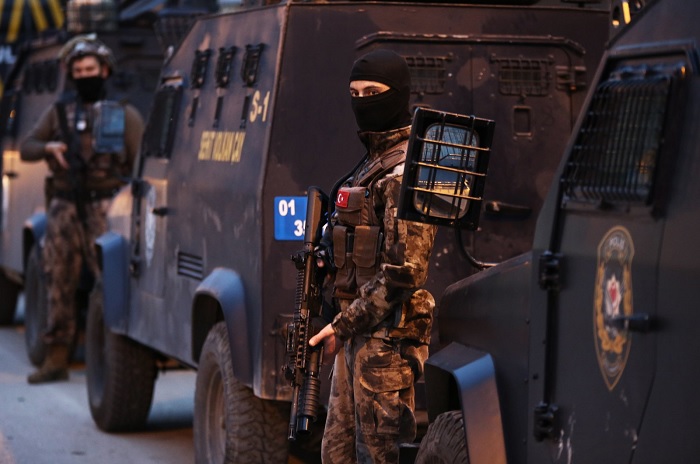
Turkish police detained 16 foreign nationals over links to the Daesh terrorist group as part of a counterterrorism operation in the capital Ankara.
The suspects had been in contact with Daesh terrorists in conflict zones, Ihlas News Agency (IHA) reported, citing security sources.
The identities of the suspects have not been released but some of them were Iraqi nationals, the report said.
Police are still trying to nab another three suspects as part of the operation.
The terrorist group has been trying to establish a new formation in Turkey after receiving a heavy blow in Iraq and Syria. According to testimony by terrorists detained in previous operations in Adana province, Daesh had been trying to kidnap judges, prosecutors and tourist groups as ransom in return for Daesh terrorists held in Iraq and Syria.
Turkey detained the so-called “Turkey emir” of Daesh, named Mahmut Özden, in August. He was planning to carry out an attack on Hagia Sophia Grand Mosque and target politicians, nongovernmental organization (NGO) heads and other prominent figures in Turkey, according to the official investigation.
Police deciphered encrypted messages of Daesh sent by the terrorist ringleaders in Syria and Iraq, with a wide range of instructions, including kidnapping tourist groups, prosecutors and deputies, attacking Incirlik Air Base in Adana and other plans.
The process that led to Özden’s arrest started with the detention of terrorist Hüseyin Sağır, who was plotting an attack near Istanbul’s famous Taksim Square.
The investigation revealed that Sağır had been receiving instructions from Özden to carry out the attack. Özden had also formed several groups of terrorists to carry out activities in rural areas, including recruiting new members, purchasing supplies and providing accommodation for terrorists.
Although the terrorist group has been largely defeated in Iraq and Syria, its presence still poses a threat, as individuals following its ideology encourage others to carry out violence. European analysts have also warned against attacks by Daesh, as attacks by isolated individuals not under the watch of intelligence services have become more common.
Turkey recognized Daesh as a terrorist group in 2013, and since then, the country has been attacked numerous times, including 10 suicide bombings, seven bombings and four armed assaults, which have killed 315 people and injured hundreds more.
In response, Turkey launched military and police operations both inside and outside the country, capturing top Daesh members in counterterrorism efforts at home and in Syria.
Turkish intelligence played a key role in the death of Daesh leader Abu Bakr al-Baghdadi by detaining and extraditing one of his aides to Iraq, who provided U.S. authorities with critical information for locating him.
 Eurasia Press & News
Eurasia Press & News


